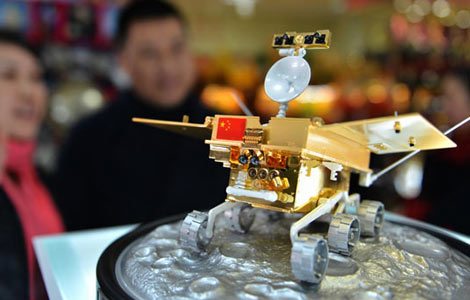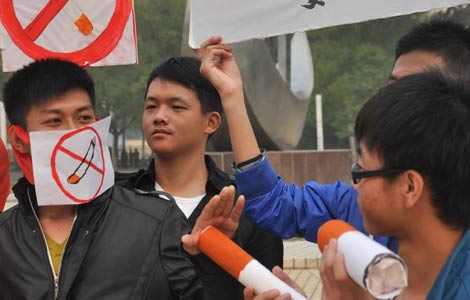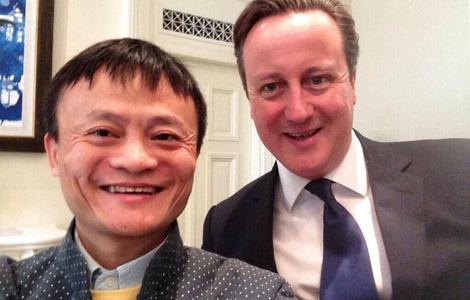Pacific pact a boon for China: experts
Updated: 2013-12-05 10:06
(China Daily USA)
|
||||||||
While some experts argue that US-led Trans-Pacific Partnership (TPP) talks are intended to counter China's growing influence in the Asia-Pacific region, others see the deal, if reached, as a good thing for China.
"It happens that a number of problems that exist in China's current system are ones that the TPP addresses, like intellectual property rights, the role of state-owned enterprises, supply chain management, and investments," said Richard Bush, director of the Center for East Asia Policy Studies at the Brookings Institution, at a panel discussion held at the Atlantic Council in Washington on Tuesday.
Bush said he foresees that the TPP will help advance China's economic reform whose importance Chinese leaders are already aware of.
"I think the best situation here is that China's leaders decide that reform is important, and they push to get it done to meet the domestic interests as they surely will, so that TPP becomes useful to bringing in some external incentives for that reform," Bush said.
Acknowledging that the TPP is in China's interest, Bush said, "The benefits from the existing economic model are diminishing, so reform is really necessary. And TPP, if China is willing to take that on, becomes a vehicle for domestic reform."
The Chinese government has expressed in recent months its interest in learning more about the TPP process and details. President Xi Jinping told President Barack Obama at Sunnylands, California, in June that China was interested in having information on the TPP process as it went forward.
"China is very much in an information mode now, seeking more transparency, but I think it's premature to say they are looking to join the negotiation," Bush said.
On Nov 20, US National Security Advisor Susan Rice said the US welcomes any nation that is willing to live up to the high standards of this agreement to join and share the benefits of TPP. "And that includes China," she said.
The TPP talks started in 2010 as an effort to significantly expand a 2005 version of the Trans-Pacific Strategic Economic Partnership Agreement (TPSEPA) between Brunei, Chile, New Zealand, and Singapore to include as many as 12 countries. Led by the US, the negotiations now involve new members including Japan, Vietnam, Malaysia, Mexico, Peru, Australia, and Canada. Last Friday, the Republic of Korea also expressed its willingness to join the talks.
Obama has ordered the TPP talks wrapped up by the end of this year, but uncertainties still abound as individual countries haggle over their own national interests. The US hoped that such a high-level free-trade agreement would boost the prospects for maintaining the US' economic leadership in the region, as well as bringing more job opportunities back home to the US.
The process has also been dealt a setback since the whistleblower website WikiLeaks published on Nov 14 a complete draft of the treaty's Intellectual Property Rights chapter. The release has put the TPP talks under public scrutiny and made it face bipartisan opposition from the Capitol Hill. According to media reports, 151 Democrats and 23 Republicans in the US House of Representatives signed letters to the US' chief negotiators expressing opposition to a fast track vote on the proposed agreement.
Clyde Prestowitz, president of the Economic Strategy Institute who also served as counselor to the Secretary of Commerce in the Reagan Administration, said that an agreement on TPP won't be "an easy sale" to the Congress, since "it's hard to see the deal will do much for the US economy".
"It doesn't look like that it's going to be a big deal economically, and the reason for that is because in fact much of the content, so far as we know it, is not so much about trade as it is about regulation and actually about monopoly and restraints," Prestowitz said.
Prestowitz also laid out a set of facts that he thought were problematic during the TPP negotiation, including the absence of talks on currency values of the participating countries and the lack of investment incentives in each of the member countries.
But given that tensions have now escalated in the Asia Pacific region since China's declaration of an Air Defense Identification Zone (ADIZ) that covers its disputed territories with Japan, Prestowitz said the situation "does increase the desire to get the TPP done". However, he didn't see the possibility of its completion by this year, but rather early next year.
"I think the difficulty is selling it to the legislators, particularly to the US Congress where it will be scrutinized more from the economic perspective. But maybe not, I mean the tension in the region also influences the Congress, so maybe that will actually facilitate the passage of the deal," Prestowitz said.
Deng Xianlai contributed to the reporting.

 NBA game in Mexico City postponed
NBA game in Mexico City postponed
 Cameron shows table tennis skills in China
Cameron shows table tennis skills in China
 Deck the White House halls
Deck the White House halls
 China puts simulation models moon rover on market
China puts simulation models moon rover on market
 Tourism not affected, says Thai envoy
Tourism not affected, says Thai envoy
 Debate over accident shows 'crisis of trust', experts say
Debate over accident shows 'crisis of trust', experts say
 Cities struggling to enforce bans on smoking in public
Cities struggling to enforce bans on smoking in public
 Cameron posts selfie with Jack Ma
Cameron posts selfie with Jack Ma
Most Viewed
Editor's Picks

|

|

|

|

|

|
Today's Top News
China tops Times rankings of universities in BRICS
Disney, China's BesTV agree on joint venture
China Mobile 'big winner' in 4G
Dialogue 'key to relations'
Value-added tax reform expands
Pacific pact a boon for China
Japan launches security council
China eyes high-level FTAs network
US Weekly

|

|






